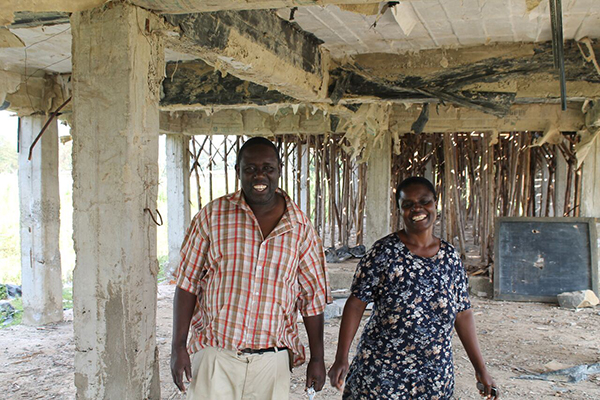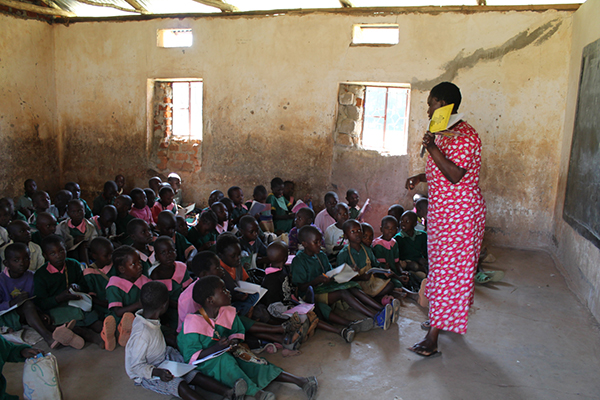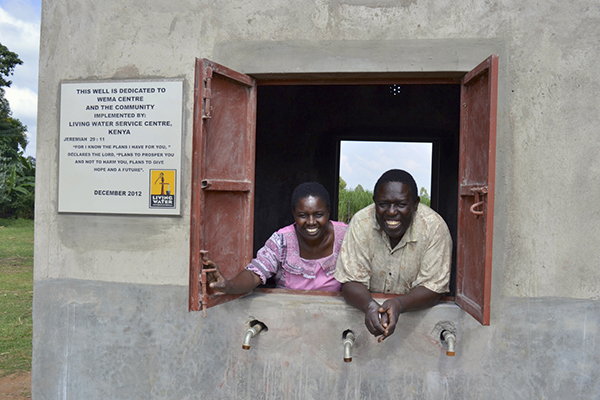Teresa’s Story: A Tired Teacher Carries on in Kenya
Categorized as: Africa, Education, Our Partners, Stories, Youth & Tagged as: Kenya, Rural education, The School Fund on November 14, 2015. Related Grantee: The School Fund.

![]() By Laura D’Asaro, Cofounder and V.P. of Wema Children’s Centre, for The School Fund
By Laura D’Asaro, Cofounder and V.P. of Wema Children’s Centre, for The School Fund ![]()
I am at a public school in Kenya. In a tiny room sit 200 first graders, cross-legged on the floor. Shouting above the noise from the classroom next door penetrating the thin walls of the classroom, the teacher, Teresa, tries to teach the children to read, explaining the rules of pluralization. She patiently repeats and explains, but keeping 200 seven-year-olds engaged and learning is nearly impossible, and the stark reality is that most of these students will drop out before high school and many will never learn to read, as is shown by the 50% illiteracy rate of the community surrounding the school. Teresa finishes the lesson and walks out the door, a stream of screaming children flowing out around her and walks across the red dirt road. She walks through a gate labeled “Wema Childen’s Centre” in hand-painted letters, and finally sits down, exhausted.
 Teresa in the public school classroom.
Teresa in the public school classroom.
My name is Laura D’Asaro. I met Teresa while studying abroad in college, helped connect Wema to the School Fund, and still serve on the Wema Children’s board. However, Wema is Teresa’s school and this is Teresa’s story. I feel like so often these stories are about us Americans and our role in helping Africa, so I wanted this to be about the woman who started her own school across the street from the public one where she teaches to give her village an education and a future that would otherwise be impossible, and who inspires me to help her make this dream possible.
Teresa grew up during a time when in Kenya there was still very little education, especially for girls. So by the time Teresa started school, her father had given up on girls and on her education and refused to support her. However, although her mom was illiterate, she knew other women who had gotten some education and seemed better for it. Teresa’s mom did extra odd jobs to make money for Teresa’s school fees and when the other kids were on holiday, Teresa worked on farms to support her education. Teresa fought for her education and was one of the lucky ones who learned enough in public school to continue her education past eighth grade. However, when you get her talking about public school, her passion and anger is contagious.
“Many children are in school doing what when they are not even succeeding!?” she says, as we walk down the road past a farm where a woman is hammering the ground rhythmically, breaking up the hard dirt for planting. “You find that they don’t improve their literacy level at those public schools. You find children in class three cannot even read and write, and those who go up to class seven can still not read and write. They have come out of grade eight and they are not enabled in anything! They just go back and live like their parents, so there is a difference in quality of education, that which enables and that which locks out everyone to stay the way they are!”
So Teresa and her husband Stephen started Wema. Wema started as a private school and became one of the best in Western Kenya. Paying students come from around the area to attend and get the high quality education unavailable at public school, but Teresa didn’t just want to start another private school. She wanted to help those who couldn’t afford this quality of education, so the funds from tuition are used to enable poor and orphaned students in the community to also study and live there. However, there are always too many students who want to attend and not enough money.
 Teresa and Stephen.
Teresa and Stephen.
Stephen works at a sugar factory as a chemist to support the orphanage and Teresa walks everyday across that road to teach at the public school to bring in extra income.
It’s not easy. “Wema has taken a lot of the family resources,” she tells me. “We would have ventured into other businesses and would be more richer!” she says, cracking into a smile. “But we looked at our community and said, people who make a difference in their places are just like us!”
But if you ask Teresa why she has given her life to this, she will light up and tell you.
“In Kenya, education is the only tool to finish the problem of the people,” she says, her dark eyes bright with passion. “Otherwise any other way does not work. Like you give them food, tomorrow they will still need the food. They will still retain the poverty. The needs will still be there. But if you invest in education, you are enabling them to be, to improve economically, so they will be empowered in the mind and go in for quality, and on their own they will improve.”
“…every time I leave the village and head back down those red dirt roads to my black paved ones, I think about how much better every community would be if they had a Teresa.”
And it takes just one look to see what she means. I meet a girl named Faith, who come from a family where nobody can read, sitting outside reading a book. I talk to a boy named Wellington who was orphaned due to AIDS and he tells me with the biggest smile that he wants to be a doctor. Teresa can already see the village changing. There’s a new well now at Wema that the community uses to obtain water. They have a computer lab, and children and adults who have never touched a computer tentatively poke at the keyboard, trying to find the letters to write their first words. There’s a waitlist to get in longer than Teresa will ever be able to accommodate, and everyday as she walks back from the public school, exhausted, she thinks of how if they could just let in one more child, what a difference that could make in his or her life. And every time I leave the village and head back down those red dirt roads to my black paved ones, I think about how much better every community would be if they had a Teresa.
So here’s to all the unsung heroes who spend their lives making their villages and their communities stronger and to The School Fund for connecting us to them and giving us a glimpse of the value of education and what one determined person and their big ideas can do with a little help.
You can support Wema students through The School Fund.
LEARN more about The School Fund’s students here.
DONATE directly to The School Fund here.
SHARE this story on Facebook and Twitter; see menu at top and bottom of page.
SUBSCRIBE! Like what you see? Click here to subscribe to Seeds of Hope!
